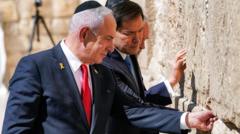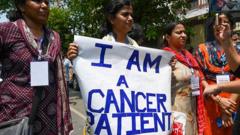Is the US Secretary of State Supporting Israeli Settler Archaeology in Jerusalem?

Published: 2025-09-16 06:05:22 | Category: world
US Secretary of State Marco Rubio's inauguration of a controversial archaeological tourism site in occupied East Jerusalem has sparked significant backlash. The site, known as the "Pilgrimage Road," is operated by an Israeli settler group and has raised concerns about the impact on local Palestinian communities and international law.
Last updated: 11 October 2023 (BST)
Key Takeaways
- Marco Rubio inaugurated the "Pilgrimage Road," a site excavated under Palestinian homes in East Jerusalem.
- The site is operated by Elad, an Israeli settler organisation, in the Palestinian neighbourhood of Silwan.
- Palestinian rights groups condemned the event, viewing it as endorsement of illegal settlements.
- Residents have faced evictions and home demolitions to facilitate the archaeological park's expansion.
- The excavation is said to trace a Roman-era street linked to important religious sites.
- Critics argue the site and its promotion undermine the historical and cultural context of Jerusalem.
The Inauguration of the Pilgrimage Road
The opening ceremony of the "Pilgrimage Road" took place at the City of David, a site that has become a focal point for archaeological and religious tourism. Rubio, as the US Secretary of State, was positioned as a guest of honour, which some see as a politically charged statement amidst ongoing tensions in the region. The road itself is part of a larger network of tunnels and excavations beneath the city, aimed at highlighting Jewish historical narratives.
Context of the Site
The Pilgrimage Road purportedly follows an ancient route taken by pilgrims during the Roman era. This route is believed to connect significant religious sites, particularly those revered in Judaism, such as the Western Wall, which is adjacent to the al-Aqsa mosque, a site of immense importance in Islam. The project's intent is to promote tourism and underscore Jewish heritage, yet it has been met with fierce criticism from Palestinian advocates.
Local Impact and Community Response
Residents of Silwan, where the excavation is located, have endured years of uncertainty due to Israeli settlement expansion. Many families face eviction orders, and home demolitions are reported to clear space for the archaeological park. Local resident Fakhri Abu Diab highlighted the human cost of such developments, expressing frustration at the prioritisation of archaeological tourism over Palestinian lives and histories.
Legal and Ethical Considerations
Settlements in East Jerusalem are widely regarded as illegal under international law, a perspective supported by various United Nations resolutions. The ongoing expansion of such settlements raises ethical questions regarding the rights of Palestinian residents and the management of historical sites. Critics argue that the US government's support for these initiatives, as exemplified by Rubio's presence, undermines international law and Palestinian rights.
Statements from Officials
Rubio described the excavation as "perhaps one of the most important archaeological sites on the planet," asserting its significance for people in the United States. His comments have drawn ire from Palestinian advocates, who view them as dismissive of the broader implications of such projects. Ze'ev Orenstein, representing the City of David, defended the excavation methods, stating they adhere to the highest archaeological standards, but refrained from engaging further on the contentious issues surrounding the site.
The Role of the Elad Organisation
Elad, the settler group managing the City of David, has been at the centre of controversy for its role in appropriating land and pushing for the eviction of Palestinian families. The group aims to strengthen Jewish connections to the area, yet its actions are often seen as exacerbating tensions and undermining the rights of existing residents. A July report by the UN's Independent International Commission of Inquiry has highlighted these practices, framing them as part of a broader trend of displacement and settlement expansion in East Jerusalem.
Reactions from Advocacy Groups
Palestinian rights organisations, such as Peace Now, have condemned Rubio's visit as an endorsement of Israeli sovereignty over contested areas. They argue that the opening of the Pilgrimage Road represents a significant shift in the US stance on Jerusalem and could further entrench divisions within the city. The group emphasised that the site should be a shared space for all faiths, rather than a tool for political or religious narratives that favour one group over another.
Jerusalem's Sacred Status
Jerusalem is often described as a city sacred to multiple faiths, including Judaism, Islam, and Christianity. The city's complex history and diverse religious significance make it a focal point for conflict and negotiation. The ongoing developments in and around the Old City, particularly those that prioritise one faith's narrative, threaten to undermine the city's status as a place of shared heritage.
International Reactions and What Lies Ahead
The international community remains divided on issues surrounding Israeli settlements and archaeological projects in East Jerusalem. Some countries support Israel's right to develop historical sites while others call for adherence to international law and respect for Palestinian rights. The implications of Rubio's visit may reverberate through diplomatic channels, impacting US relations with both Israel and Palestine moving forward.
Future Developments
As tensions continue to simmer in the region, the situation in Silwan and surrounding areas will likely remain unstable. The combination of archaeological tourism and settlement expansion could lead to further clashes between residents and authorities. Advocacy groups are expected to intensify their campaigns against such developments, aiming to draw global attention to the plight of Palestinians facing displacement.
Conclusion
The inauguration of the Pilgrimage Road by Secretary of State Marco Rubio has highlighted the ongoing complexities surrounding archaeological tourism in East Jerusalem. The site represents not only a significant archaeological venture but also a flashpoint for broader political and social issues affecting Palestinian communities. As the international community grapples with these challenges, the future of Jerusalem as a place of shared heritage remains uncertain. Will the pursuit of tourism and historical narratives come at the cost of justice and equality for all its residents?
#Jerusalem #PalestinianRights #ArchaeologicalTourism
FAQs
What is the Pilgrimage Road?
The Pilgrimage Road is an archaeological project in East Jerusalem that traces an ancient route believed to have been used by pilgrims during the Roman era, connecting significant Jewish religious sites.
Why is the site controversial?
The site is controversial due to its location under Palestinian homes, the involvement of the Israeli settler group Elad, and the broader implications for Palestinian rights and international law.
What are the implications of Rubio's visit?
Rubio's visit is viewed as an endorsement of Israeli sovereignty over contested areas in Jerusalem, raising concerns about US support for Israeli settlement policies and their impact on Palestinian communities.
How have Palestinian residents responded?
Many Palestinian residents, such as Fakhri Abu Diab, have expressed anger and frustration at the ongoing evictions and demolitions, highlighting the human cost of the archaeological projects.
What is the status of Israeli settlements?
Israeli settlements in East Jerusalem are widely regarded as illegal under international law, and their expansion has led to significant tensions between Israelis and Palestinians.
What role does Elad play in the area?
Elad is a settler organisation that operates the City of David and has been involved in land appropriations and the eviction of Palestinian families, contributing to the controversy surrounding archaeological efforts in the area.



